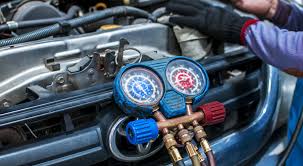As summer temperatures start to rise, many of us rely on our vehicle’s air conditioning (AC) system to stay cool and comfortable during our commutes. However, running the AC can increase your fuel consumption and impact your gas mileage. Understanding how much gas your AC uses can help you make more informed decisions about when to use it and how to maximize your fuel efficiency.
The Impact of AC on Fuel Consumption When you turn on your car’s AC, it places an additional load on the engine, requiring more power to run the compressor that circulates the refrigerant through the system. This extra power demand translates into increased fuel consumption. According to the Environmental Protection Agency (EPA), using your AC can reduce your fuel economy by up to 25% in urban driving conditions.
| Topic | Details |
|---|---|
| Impact on Fuel Consumption | – AC can reduce fuel economy by up to 25% in urban driving conditions – For a car getting 25 mpg without AC, using AC could reduce it to 19 mpg (about 1 extra gallon per 100 miles) |
| Factors Affecting AC Fuel Use | – Outside Temperature (e.g. 90°F could increase fuel use by 20% more than 70°F) – Vehicle Age and Efficiency (Older/larger vehicles use more fuel for AC) – Driving Conditions (City driving uses more AC power than the highway) – Cabin Size (Larger cabins require more cooling power) |
| Alternative AC Technologies | – Outside Temperature (e.g. 90°F could increase fuel use by 20% more than 70°F) – Vehicle Age and Efficiency (Older/larger vehicles use more fuel for AC) – Driving Conditions (City driving uses more AC power than the highway) – Cabin Size (Larger cabins require more cooling power) |
| Tips to Reduce AC Fuel Use | – Use windows/vents instead of AC under 40 mph – Park in shade – Maintain AC system (filter, refrigerant levels) – Use Eco mode – Use window tints/sunshades |
| Regional Differences | – Electric AC systems in EVs increase range by 10-15% over traditional – Hybrid AC systems use electric compressors for better efficiency |
| Case Study | – Hot regions like the Southwest US can see over 30% city mpg reduction from AC – Milder regions like the Pacific Northwest may only see a 10-15% reduction |
| Future Outlook | – Automakers adopting electrified powertrains – Technologies like heat pumps and thermal management could minimize future AC fuel penalties |
For example, if your car typically gets 25 miles per gallon (mpg) in city driving without the AC, using the AC could reduce that to around 19 mpg – an increase of about 1 gallon of gas consumed for every 100 miles driven.
Factors Affecting AC Fuel Consumption
The amount of gas your AC uses can vary depending on several factors:
- Outside Temperature: The hotter it is outside, the harder your AC has to work to cool the cabin, leading to higher fuel consumption For instance, driving in 90°F weather could increase AC fuel use by 20% compared to 70°F.
- Vehicle Age and Efficiency: Older vehicles and less efficient AC systems may consume more fuel than newer, more efficient models. A study found that a midsize sedan used 20% more fuel with the AC on, while a large SUV used 25% more.
- Driving Conditions: Stop-and-go city driving tends to use more AC power than highway driving, where the airflow over the condenser helps cool the system. AC impact on mpg is lower on the highway.
- Cabin Size: Larger vehicles with more cabin space require more cooling power, leading to higher fuel consumption.
Alternative AC Technologies
While most vehicles use traditional vapor compression AC systems, some newer models are adopting more efficient electric and hybrid AC technologies that can reduce fuel consumption:
Electric AC systems, powered by battery rather than engine, increase the range in electric vehicles by 10-15% compared to traditional systems. Hybrid AC systems use an electric compressor supported by the engine to improve efficiency over traditional belt-driven compressors.
Tips to Reduce AC Fuel Consumption

While it’s tempting to crank up the AC on scorching summer days, there are several strategies you can employ to minimize its impact on your fuel economy:
- Use the Air Vent or Open Windows at Lower Speeds: When driving at lower speeds (under 40 mph), open windows or use the air vents to cool the cabin instead of the AC.
- Park in the Shade: Parking in the shade can help keep your car’s interior cooler, reducing the workload on the AC when you start driving.
- Maintain Your AC System: Regular maintenance, such as changing the cabin air filter and ensuring proper refrigerant levels, can improve the efficiency of your AC system.
- Use the “Economy” or “Eco” Mode: Many modern vehicles have an “economy” or “eco” mode that can help reduce the AC’s impact on fuel consumption.
- Consider Alternative Cooling Methods: Using a window tint or a sun shade can help reduce the heat entering your car’s cabin, minimizing the need for intense AC usage.
Regional Differences Climate plays a big role in AC fuel impacts. In hot regions like the Southwest US, AC use can reduce city fuel economy by over 30%. But in milder climates like the Pacific Northwest, the impact may only be 10-15%.
Case Study:
John’s Commute John has a 2015 Honda Accord that usually gets 28 mpg around town. His 25-mile commute takes him through the city and highway portions. John ran a test over a month:
Without AC: 28 mpg average With AC on: 22 mpg average (-21% fuel economy)
By using his AC judiciously and employing tips like idling with vents open and parking in the shade, John was able to improve his AC fuel economy to 25 mpg, saving over $100 in annual fuel costs.
Looking Ahead As automakers continue to prioritize fuel efficiency and adopt electrified powertrains, the future relationship between AC use and fuel consumption is expected to evolve. Technologies like heat pumps, advanced thermal management, and integrated battery cooling could minimize AC fuel penalties in next-generation vehicles.
Also Read:
- Flat Tire But No Hole? Here’s What to Do
- What’s the Real Cost of Muffler Repair or Replacement?
- Car Jerks When Accelerating? Here’s What Could Be Wrong
While air conditioning is a welcome comfort during hot summer months, being mindful of its fuel consumption impact can help you strike a balance between comfort and fuel efficiency. By following these tips and using your AC judiciously, you can enjoy a cool ride without breaking the bank at the gas pump.



[…] How Much Gas Does Your Car’s AC Use? […]